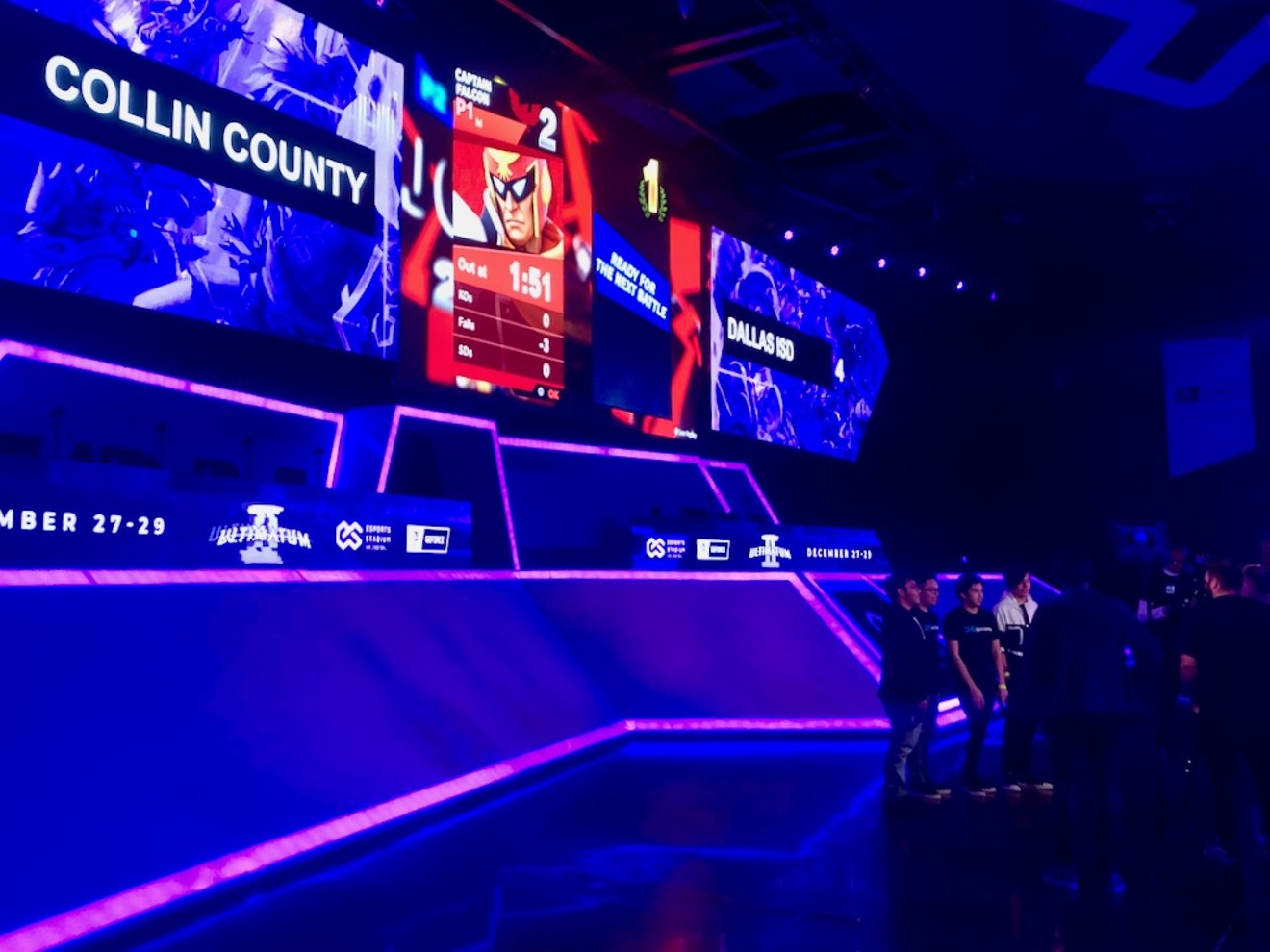They were playing Nintendo.
Mixed into the crowd were parents, classmates, coaches and district administrators. This tournament, they said, is a sign of things to come.
The Dallas ISD board is considering funding a competitive video game program at 65 middle and high schools. Administrators propose outfitting schools with new gaming equipment, funding nearly 800 students' participation in weekly matches and organizing two district-wide tournaments at the ballpark.
Organizers hope that it will help reach kids who aren’t yet participating in other extracurricular activities.
“Having that peer-to-peer relationship, being a bigger part of the community at your school and the relationship with your mentor and coach — all of that is just invaluable. And it can completely change the school experience for kids,” said Sharla Hudspeth, the district’s director of student activities.
The program will cost nearly half a million dollars and will be funded by a budget amendment that will be presented to the school board in November, Hudspeth said. It is likely to be approved. At a briefing earlier this month, a majority of the board's members expressed excitement over the proposal.
“I’m thrilled you guys are going down this path,” said trustee Dustin Marshall, who is CEO of a logistics company and a former ranked Mortal Kombat and Warcraft player. “I think it’s great we’re meeting students where they are."
In the meantime, Hudspeth plans to push ahead with the rollout, using general funds from the student activities department, which runs 12 other extracurriculars from chess to cheerleading. The plans include an after-school gaming club for middle schoolers and a weekly inter-school league for high schoolers.
Seemingly overnight, video gaming has gained the trappings of legitimacy more commonly associated with sports like football or basketball, including full-ride scholarships and national championships.
The University of Texas at Dallas celebrated its first championship — in any sport — last month when it won the Collegiate Starleague Smash Ultimate National Championships in Massachusetts. Over 150 colleges offer esports scholarships, according to the National Association of Collegiate Esports.“Initially, parents were reluctant. ... But they're seeing now that it is a multibillion-dollar industry, with careers and college scholarship opportunities and people becoming millionaires.” — Sharla Hudspeth
tweet this
High schools are beginning to get in on the action.
“Initially, parents were reluctant. They say, all you're doing is spending all your time playing video games. But they're seeing now that it is a multibillion-dollar industry, with careers and college scholarship opportunities and people becoming millionaires,” Hudspeth said.
Dallas has become a hub for the burgeoning industry. It’s home to id Software, creator of iconic games such as Quake and Doom, as well as Team Envy, an esports franchise funded by oil magnate Kenneth Hersh.
Justin Rojas, a Team Envy executive, grew up playing video games. He graduated from Booker T. Washington High School in downtown Dallas in 2002, and wants more local kids to be exposed to similar opportunities in the rapidly changing industry.
“Five years ago, what I do now didn't exist,” he added. He said Team Envy is actively looking for ways to support the Dallas program, such as offering workshops for coaches and students.
One of the beneficiaries of this gold rush is Play Versus, a company that runs competitive gaming leagues for high schools across the country and is a proposed partner for Dallas ISD. Like many stars of the esports industry, Play Versus is young and startlingly successful.
Founded in 2018, the Los Angeles startup has already raised over $100 million. Its investors include rapper P. Diddy, Samsung, Adidas and the owner of the Los Angeles Dodgers. Executives from Google and Twitch sit on its board. The company is working to get video gaming officially sanctioned as a high school sport through partnerships with the National Federation of State High School Associations and 17 states' associations.
Texas isn’t yet one of them. But last year, administrators at W.W. Samuell High School contacted Play Versus after hunting for a league for interested students. They then sold the idea to the district, which hosted a workshop in September for students and parents. The response was enthusiastic, and plans for an initial pilot of 20 schools were scrapped in favor of a larger rollout.
High schoolers will compete in six-person teams against other schools across the nation using Play Versus' platform.
“This is our hook, this is how we bring them in and get them engaged,” said Samuell's vice principal, Roberto Velasco, who said that gaming is a way to get kids interested in careers in IT and computer science.
There is plenty of reason to be skeptical of using public funds to promote video gaming among children. The World Health Organization recently added “gaming disorder” to its official list of addictions, and South Korea has struggled with the problem to such an extent that the government passed a law in 2011 banning kids under 16 from playing online games after 10 p.m.
Some private schools in the Bay Area have banned screens altogether.
But researchers and school administrators point to a link between participation in extracurriculars and increased attendance and grades. Proponents say it also helps boost “soft skills” like creativity and collaboration that are valued by modern employers. Researchers at the University of California, Irvine have shown — with funding from the North American Scholastic Esports Federation — that kids who participate in esports leagues show increased interest in STEM careers and improved social skills.
But evidence proving that the concentration required to master Super Smash Brothers will rub off on a Monday morning calculus exam is slim.
“Transfer is the biggest question mark, as far as I'm concerned,” said Clint Kennedy, Play Versus' director of education, adding that there’s “not a lot of hard and fast empirical evidence that we can do that.”
For the kids, long steeped in gaming culture, the league’s draw is obvious. Jassiel Lorea, a Samuell student and member of the five-person squad that advanced out of the Saturday tournament, said he competes in esports because it’s fun.
“It’s just a pastime,” he said, “but it’s good to have a tournament you can win for doing something you just like.”












